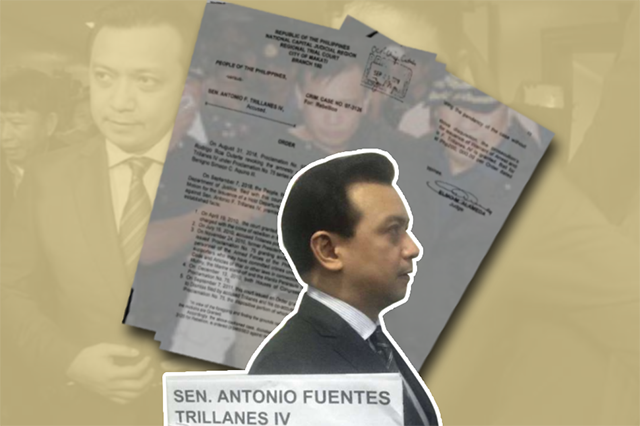Still on Trillanes Amnesty: Few Reports Questioned Court Ruling
MAKATI REGIONAL Trial Court (RTC) Branch 150 Judge Elmo Alameda on September 25 reopened the rebellion case against then Navy officer Antonio Trillanes IV that he had dismissed in 2011, when the now senator was granted amnesty by then President Benigno Aquino III.
President Rodrigo Duterte voided that amnesty last September 4 in Proclamation 572, saying that Trillanes’ amnesty application form was missing, and that therefore he failed to file an application and failed to admit guilt. Meanwhile, the Department of Justice filed motions for the issuance of an alias, or reissued warrant in Branch 150 and in Branch 148, which had previously also dismissed coup charges against Trillanes on the basis of Aquino’s amnesty grant.
Alameda ruled that the substitute documents that Trillanes presented, including, among others, his certificate of amnesty and sworn affidavits from Defense officials who processed his application, were “barren of probative weight,” because Trillanes failed to present an original, duplicate or photocopy of his form. He was served an arrest warrant and posted bail on the same day.
The media dutifully followed events leading to Trillanes’ arrest and eventual release. But only a few reports raised valid questions about the fairness of Alameda’s ruling, which essentially adopted the argument of the prosecution. Among these were the following:
Rappler’s explainer “Why Judge Alameda disregarded affidavits in Trillanes case” pointed out that while Alameda disregarded photographic evidence and news footage of Trillanes’ amnesty application filing, he “gave merit to the prosecution’s presentation of an authenticated GMA News article” which quoted Trillanes as saying that he was not guilty of coup charges. In an “ABS-CBN report” aired on September 25, Magdalo Representative Gary Alejano described this ruling as applying a double standard on the admission of evidence.
Interaksyon’s “Trillanes’ arrest: More legal questions raised over Makati court’s order” cited some arguments posted on social media by lawyers, such as Far Eastern University Institute of Law Den Mel Sta. Maria and Atty. Jego Ragragio, and law students who criticized the court for shifting the burden of proof to Trillanes.
The Inquirer, in its editorial “A legal atrocity,” put its argument succinctly: “It (Alameda’s ruling) is fundamentally unfair, because it shifts the burden of proof; it is deeply undemocratic, because the court abandons its duty to serve as a check on power; and it is essentially anti-judiciary, because it betrays a clear partisanship.”
CMFR previously cheered the media for taking issue with a “presidential attempt to silence a critic, pointing to its lack of factual or legal basis. (See: “Media on Trillanes’ Amnesty: Quick Resistance in Aid of Democratic Values“)
They will have to continue to report with more legal backgrounding as the case unfolds in the different venues of the judiciary. Otherwise, they will not inform the public about how the courts are performing or failing in their duty.

Leave a Reply